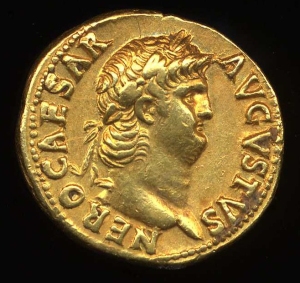
It was Nero’s 1,979th birthday yesterday and I think it’s probably time to look at him again. Among the general public he is generally regarded as a lunatic who burned Christians to death and fiddled while his city burned. Among historians he is generally regarded as a slightly fey fop who was in far over his head and lost his mind when he began to understand the sheer scope of his power.
To my mind both of these views are insufficient.
Picture a man who knows himself to be a God. He is not big headed or arrogant as such, he is a God. He is a God, a descendent of Gods and he carries on the work of his ancestor Gods. And yet, despite this knowledge of his own divinity, he is most fond of some of the most despised people in his dominion.
Nero loved acting, poetry and singing. According to Seutonius ‘he often appeared in public in a dining-robe, with a handkerchief bound about his neck’ and he never wore the same garment twice. He loved theatre above all, it was his abiding passion. He was, let’s face it, a cravat wearing 19th century fop born a couple of millennia too early.
Which is why it is perhaps stunning that, in the early part of his reign, he was reasonably well regarded by the masses of the roman people. Not the aristocracy, of course, they thought he was a disgrace. And when he took to the stage to pursue his dream of being an actor the aristocracy regarded it as a dreadful, undignified scandal. He performed his poetry to the public, he sang and played his lute for them, and though they had no option but to do so there’s no real evidence to suggest their applause weren’t genuine.
Then, before the horrors of his later life when ultimate power would consume him utterly, Rome burned. Nobody knows the cause, though it was most probably arson and could very possibly have been arson by Christian terrorists. Later it would be said that he cackled, that the scandalous lover of music watched Rome burn and did nothing but play his fiddle, but contemporary accounts tell a different story.
He opened his private estates to refugees. He did his best to prevent looting. He began a huge program of public works to rebuild and to employ the thousands upon thousands who had lost everything in nine days of inferno.
But his vision stretched further than that.
Nero was never a man to think small. He saw an opportunity to remake the eternal city before him. Instead of cramped alleys and impenetrable mazes there would be plazas, and statues, and wide avenues. His would be a Rome of art and high culture, not stern and stoic functionality. He would rebuild the empire to suit his vision, it would be an empire of staggering beauty and soaring art. No longer would actors be viewed as the scum of the earth, no longer would poetry be the domain of the young and empty headed, Rome would reshape the world to be elegant, inspiring and majestic.
It didn’t work, of course. The cost of such an operation would have been incomprehensibly massive. The world turned, Nero began to resent his failures and from there on his reign is a cascade of increasing horror. Power tends to corrupt, and absolute power corrupts absolutely, being a good man is incompatible with being a God.
But imagine for a moment that it had worked. Picture it; the civilisation that lies at the foundation of all of western culture turned primarily to the creation of beauty. What could have come of that? What sort of a world would we live in? It may well have been worse, of course, but think of the possibilities of a world founded and grounded in the philosophy of the aesthete.
Nero failed, but his vision as he stood and gazed at the ashes of the greatest city in the world is one that would have swept me away. I would have loved him for that romanticism, for that glory. Perhaps loved him enough to follow him as he marched into hell.
Salve, Imperator.
With thanks to LJ Trafford for drawing my attention to the Suetonius quote on Twitter and to Tom Holland for the excellent narrative biography of his life in his book ‘Dynasty.’

You must be logged in to post a comment.